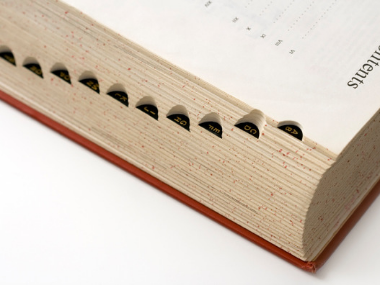One Word
One Word: Line

I am wondering about this request to say something about "a word." As a person of many words, I find the singular form of that noun somewhat daunting as a subject for thought. A word by itself seems to me like the proverbial lost ball in tall weeds. Where to begin looking? A proper noun, like the name of a city on a station sign, or a ball player's name on the back of his shirt, seems like cheating, since to name a place or a person is to have a world open from it automatically, like an unfolding fan.
A word in isolation: perhaps a foreign word, which has a singular identity in an English line, and its very strangeness is its seduction, but also its risk; for instance, shantih, which, in a poem of hers, Sujata Bhatt chided T. S. Eliot for using as he did with such solemnity, since, she wrote, it was an everyday word in India, one her mother used when she wanted the children to quiet down. Then, too, giving prominence to a single word invites magnification, makes the shadow of the looming Capital Letter darken the scene, arousing fear of The Word—of which in the Beginning there was supposedly but One, and from which notion follow a thousand exclusions and the sanction of countless crimes.
So, how to circumvent this army of objections, this resistance that rises in me from a nevertheless intriguing request? What word, what improper noun, like Walt Whitman, could contain multitudes? And that is when I think of a word that recurs, in poem after poem, like a perennial in a garden, but is, by both definition and connotation, so protean that it never seems to be the same thing twice and yet, changeable as it is, is connective in its essential nature, requiring, in its most abstract and mathematical definition, more than one point, and frequently a multiplicity of them.
The word is line, which, yes, is also, obviously, the unit of verse prosody; and that, however obvious, is one of the points, giving the word a kind of punning reflexiveness back to the linguistic action in which it is used, and to which meaning is inextricably bound. Line is one those words whose complex nature poetry requires; that is, it has abstract meaning and concrete presence, so that it can (pace Archibald MacLeish) both mean and be. And both its concrete and abstract meanings are multiple and variable with context; when the world in which the word takes shape alters, so does the meaning.
Years ago a British editor objected to my repeated use of a rather blatant enjambment, calling the words "elbows" that were broken off from their syntactic units and sticking out at the end of a line. (Get your elbows off the table, a voice echoes from childhood.) At the time, partly to deflect criticism (I was young and in those days it still stung), and partly for the sheer pleasure of talking back to such a man in a language I associated with English literature and the traditional "feminine arts," I made, inadvertently, what amounted to a discovery (which is to say, before I insisted on defending what I have since decided was a failure of craft, I hadn't seen how supple, substantial, and curvilinear the poetic line was for me). I answered him, affecting the voice of a nineteenth-century woman that, my dear sir, before I had picked up the pen, I had worked with needle and thread, and thus think of the line not as a unit or bar of type in a gridlike series, but rather as a thread, a flowing, sinuous and continuous thread of connection—the end of a line resembling a bend in a river, the noticeable break in syntax meant to mime that flow around the bend, from there to the next line in the poem.
Kidding or not, it seemed that I had articulated a formal intention of which I'd been unaware. Indeed, checking with the OED, I discover that the etymology of the word was the very material I had invoked: line coming from the same root as linen, both coming from the Latin, linea: "linen thread," beneath which was the root linum, or "flax," from which thread is spun. And I was, in fact, in the poetic business of turning a grid line into a thread, and that thread, which had been, like the nineteenth-century woman I invoked, part of a condition and a design into which so many of us had been bound as surely as a figure is sewn into a tapestry—a line which I was anxious to cut, free the bound subject from the elegant, tight design, and turn that line, in a manner of speaking, and (as my metaphor of the river bend had already announced) into a stream: syntax a connective, open-ended flow, medium and message an inseparable pair, and, if I may play one more change on the word: a lifeline.

